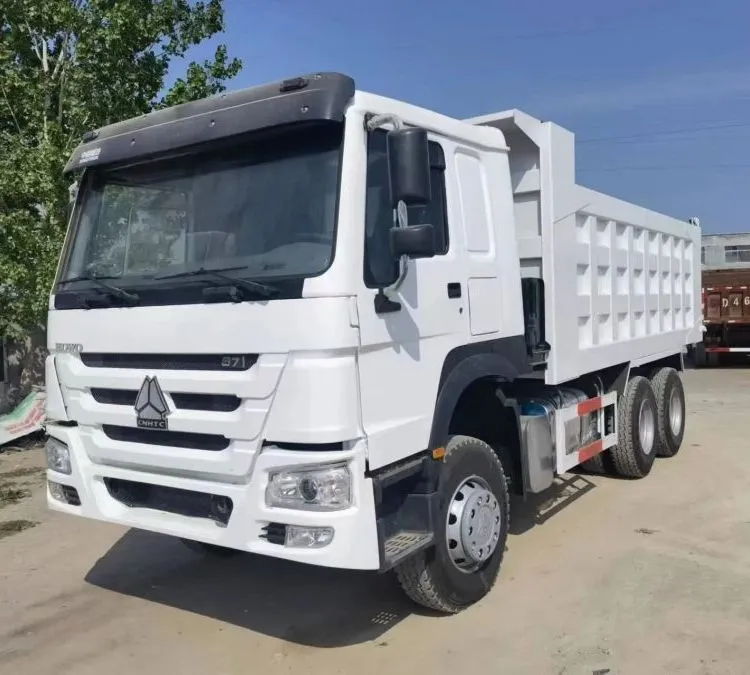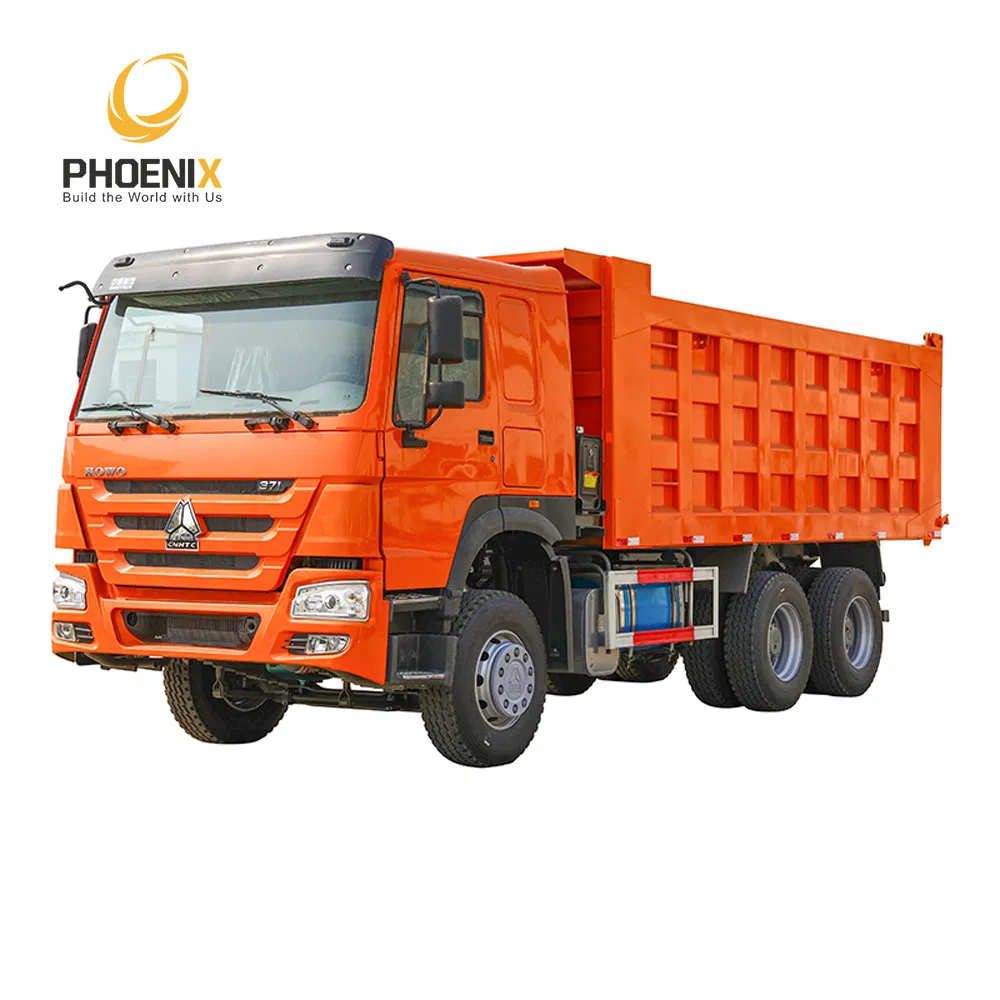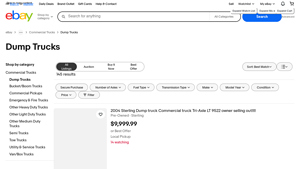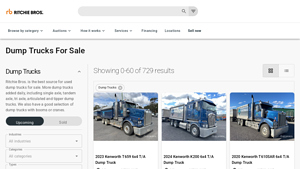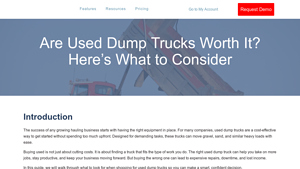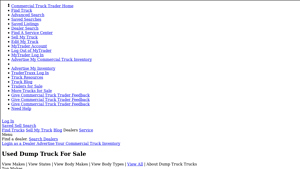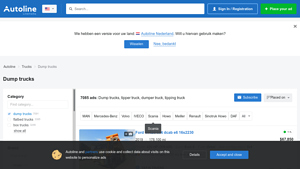Introduction: Navigating the Global Market for second Hand Dump Truck
In the ever-evolving landscape of the global construction and logistics industries, sourcing reliable second-hand dump trucks presents a significant challenge for international B2B buyers. As businesses in Africa, South America, the Middle East, and Europe strive to enhance operational efficiency while managing costs, understanding the intricacies of the second-hand dump truck market becomes crucial. This comprehensive guide is designed to empower decision-makers by offering insights into various types of dump trucks, their applications across different sectors, and practical strategies for supplier vetting.
With a focus on actionable intelligence, this guide delves into essential factors such as assessing the condition and maintenance history of used vehicles, understanding load capacities, and recognizing the importance of compatibility with specific operational needs. Moreover, it addresses critical considerations like pricing structures, financing options, and the benefits of purchasing through reputable auction platforms or dealerships.
By equipping buyers with the necessary tools and knowledge, this guide aims to streamline the purchasing process, enabling businesses to make informed decisions that align with their operational goals and budget constraints. Whether you are looking to upgrade your fleet or expand your capabilities, navigating the second-hand dump truck market is now more accessible and strategic than ever.
Understanding second Hand Dump Truck Types and Variations
| Type Name | Key Distinguishing Features | Primary B2B Applications | Brief Pros & Cons for Buyers |
|---|---|---|---|
| Standard Dump Truck | Typically has a straight dump body, ideal for general hauling. | Construction, landscaping, and waste management | Pros: Versatile, cost-effective. Cons: Limited load capacity compared to specialized models. |
| Transfer Dump Truck | Equipped with a trailer for transferring loads, enhancing capacity. | Large construction sites and quarry operations | Pros: Increased load capacity, efficient for long hauls. Cons: More complex, may require additional licensing. |
| Tri-Axle Dump Truck | Features three axles for improved stability and load distribution. | Heavy-duty construction and mining | Pros: Higher payload capacity, better stability. Cons: Higher maintenance costs, less maneuverable. |
| Quad-A Dump Truck | Four axles, designed for transporting heavy loads over rugged terrain. | Mining, heavy construction, and demolition | Pros: Exceptional load capacity, ideal for tough environments. Cons: Higher initial investment, more fuel consumption. |
| Flatbed Dump Truck | Combines a flatbed with dump functionality, offering versatility. | Transportation of bulk materials and equipment | Pros: Multi-functional, easy loading/unloading. Cons: Less secure for loose materials, may require tarping. |
What are the Characteristics and Suitability of Standard Dump Trucks?
Standard dump trucks are the backbone of many construction and landscaping operations. These vehicles feature a straightforward design with a dump body that allows for easy unloading of materials like gravel, sand, and debris. Their versatility makes them suitable for various applications, from residential landscaping to large-scale construction projects. When considering a purchase, buyers should evaluate the truck’s load capacity and engine power, as these factors directly impact performance and operational efficiency.
How Do Transfer Dump Trucks Enhance Load Capacity for Businesses?
Transfer dump trucks stand out due to their unique configuration, which includes a separate trailer for transporting materials. This design enables businesses to carry larger loads than a standard dump truck, making them ideal for extensive construction projects and quarry operations. Buyers should consider their specific hauling needs and the regulations in their region, as operating a transfer dump truck may require additional permits or licenses. These trucks are particularly advantageous for long-distance hauls, improving overall productivity.
What Makes Tri-Axle Dump Trucks a Preferred Choice for Heavy-Duty Applications?
Tri-axle dump trucks are designed with three axles, providing enhanced stability and load distribution. This feature is crucial for heavy-duty applications such as mining and large-scale construction. They can carry significant payloads, making them a cost-effective solution for businesses looking to maximize efficiency. However, buyers must be aware of the higher maintenance costs associated with these vehicles, as well as their reduced maneuverability in tight spaces, which could impact job site accessibility.
Why Choose Quad-A Dump Trucks for Rugged Terrain?
Quad-A dump trucks are built for heavy-duty tasks, featuring four axles that allow them to transport substantial loads over rough terrain. They are particularly suited for mining and demolition projects, where durability and load capacity are paramount. Although these trucks require a higher initial investment and may consume more fuel, their ability to handle extreme conditions makes them a valuable asset for businesses in challenging environments. Buyers should weigh the long-term benefits against the upfront costs when considering a purchase.
What are the Advantages of Flatbed Dump Trucks for Versatile Applications?
Flatbed dump trucks combine the functionality of a flatbed with the capabilities of a dump truck, making them incredibly versatile. They are ideal for transporting bulk materials and equipment, particularly when quick loading and unloading is necessary. However, buyers should consider the potential downsides, such as the less secure transport of loose materials, which may necessitate additional safety measures like tarping. Understanding the specific needs of their operations will help buyers determine if a flatbed dump truck is the right choice for their fleet.
Key Industrial Applications of second Hand Dump Truck
| Industry/Sector | Specific Application of second Hand Dump Truck | Value/Benefit for the Business | Key Sourcing Considerations for this Application |
|---|---|---|---|
| Construction | Transporting construction materials | Reduces transportation costs and increases project efficiency | Ensure load capacity meets project requirements; check maintenance history. |
| Mining | Hauling aggregates and minerals | Enhances operational efficiency and reduces downtime | Verify durability and suitability for rugged terrains; assess engine performance. |
| Waste Management | Collecting and transporting waste | Improves waste management processes and compliance with regulations | Look for trucks with specialized dump bodies; consider local regulations. |
| Agriculture | Transporting soil, fertilizers, and equipment | Increases productivity on farms and reduces labor costs | Check for versatility in load capacity; ensure compatibility with farming equipment. |
| Road Maintenance and Repair | Hauling asphalt and gravel for roadworks | Ensures timely completion of infrastructure projects | Assess the truck’s ability to handle varied terrains; confirm maintenance records. |
How is a Second Hand Dump Truck Used in Construction?
In the construction industry, second-hand dump trucks are vital for transporting materials like sand, gravel, and concrete to job sites. They help streamline the logistics of construction projects, allowing for quicker turnaround times. Buyers should ensure that the truck’s load capacity aligns with their specific project needs and check the maintenance history to avoid unexpected breakdowns that could delay operations.
What Role Do Second Hand Dump Trucks Play in Mining Operations?
Dump trucks are essential in mining for hauling heavy aggregates and minerals from extraction sites to processing plants. Their robust design and high load capacity enable them to operate efficiently in harsh environments. International buyers, particularly in regions with challenging terrains, must assess the truck’s durability and engine power to ensure it meets the demands of their mining operations.
How Are Second Hand Dump Trucks Utilized in Waste Management?
In waste management, second-hand dump trucks are used for the collection and transportation of waste materials. They facilitate efficient waste disposal and compliance with local regulations. Buyers should focus on sourcing trucks with specialized dump bodies designed for waste handling and consider local environmental regulations that may affect their operations.
What Are the Benefits of Using Second Hand Dump Trucks in Agriculture?
In agriculture, second-hand dump trucks transport soil, fertilizers, and farming equipment across vast fields. Their versatility helps farmers increase productivity while reducing labor costs. Buyers should verify the truck’s load capacity and compatibility with other agricultural machinery to maximize efficiency on their farms.
How Do Second Hand Dump Trucks Assist in Road Maintenance?
Dump trucks are crucial for road maintenance and repair, particularly in hauling asphalt and gravel for roadworks. Their ability to transport heavy loads quickly ensures that infrastructure projects are completed on time. When sourcing these trucks, buyers should evaluate their capability to handle various terrains and confirm the maintenance records to ensure reliability during critical operations.
3 Common User Pain Points for ‘second Hand Dump Truck’ & Their Solutions
Scenario 1: Difficulty Assessing Vehicle Condition Before Purchase
The Problem: One of the biggest challenges B2B buyers face when considering second-hand dump trucks is evaluating the vehicle’s condition. Without a thorough inspection, buyers risk investing in trucks that may have hidden mechanical issues or excessive wear and tear. This is particularly concerning for international buyers who may not have the opportunity to inspect the truck in person before purchase. Trusting photos and descriptions alone can lead to costly mistakes, affecting not only finances but also project timelines and operational efficiency.
The Solution: To mitigate this risk, buyers should prioritize sourcing from reputable dealers who provide comprehensive vehicle histories, including maintenance records and inspection reports. Utilize third-party inspection services that can conduct a thorough evaluation of the dump truck before purchase. These services often include detailed assessments of the engine, transmission, suspension, and overall structural integrity. Additionally, consider asking for a test drive or a video walkthrough to assess the truck’s performance firsthand. By doing due diligence and leveraging professional inspections, buyers can make informed decisions, ensuring that their investments are sound and reliable.
Scenario 2: Navigating Import Regulations and Logistics
The Problem: For B2B buyers in regions like Africa, South America, and the Middle East, importing second-hand dump trucks can be fraught with complications. Each country has its own set of import regulations, tariffs, and compliance requirements, which can be overwhelming. Failing to navigate these regulations correctly can lead to delays, increased costs, and even legal issues. This situation is especially daunting for businesses that may not have prior experience with international logistics and customs.
The Solution: To successfully navigate these complexities, buyers should conduct thorough research on their country’s import regulations regarding used vehicles. Engaging a logistics partner who specializes in international shipping can provide invaluable assistance in this process. These experts can help with customs documentation, tariff classifications, and compliance checks to ensure that all requirements are met. Additionally, establishing a clear communication channel with the seller can facilitate smoother transactions and help buyers understand any specific preparations needed for shipping. By collaborating with experienced logistics professionals, businesses can streamline the import process, reducing the risk of unexpected costs and delays.
Scenario 3: Uncertainty About Long-term Maintenance Costs
The Problem: A significant concern for B2B buyers of second-hand dump trucks is the uncertainty surrounding long-term maintenance and repair costs. While the initial purchase price may be attractive, unforeseen maintenance issues can lead to escalating expenses over time. Buyers may worry about sourcing parts for older models, which can vary by manufacturer and region, impacting the total cost of ownership and potentially disrupting operations.
The Solution: To address these concerns, buyers should prioritize trucks from manufacturers known for their reliability and the availability of spare parts. Researching the local market for parts and service providers can also provide insights into potential maintenance costs. Additionally, buyers can negotiate warranties or service agreements with the seller, offering some protection against unexpected repairs. Establishing a proactive maintenance schedule and working with a trusted mechanic who understands the specific model can also help mitigate long-term costs. By approaching the purchase with a focus on long-term ownership and maintenance strategies, businesses can ensure that their investment remains economically viable over time.
Strategic Material Selection Guide for second Hand Dump Truck
What Are the Key Materials Used in Second Hand Dump Trucks?
When selecting a second-hand dump truck, understanding the materials used in its construction is crucial for ensuring performance, durability, and cost-effectiveness. Here, we analyze four common materials: steel, aluminum, composite materials, and rubber. Each material has unique properties that can impact the truck’s functionality and longevity, especially in diverse international markets.
How Does Steel Contribute to Dump Truck Performance?
Steel is the most prevalent material in dump truck construction, particularly for frames and dump bodies. Key properties include high tensile strength, excellent impact resistance, and good weldability. Steel can withstand high temperatures and pressures, making it suitable for heavy-duty applications.
Pros: Steel’s durability and strength make it ideal for heavy loads, ensuring long-term performance. It is also relatively cost-effective and widely available, which is advantageous for international buyers seeking replacements or repairs.
Cons: Steel is prone to corrosion if not properly treated, which can be a significant concern in humid or coastal environments. Additionally, its weight can reduce fuel efficiency, impacting operational costs.
Impact on Application: Steel dump trucks are well-suited for transporting heavy materials like gravel and sand. However, buyers in regions with high humidity or salt exposure, such as coastal areas in Africa or the Middle East, should consider additional protective coatings.
What Role Does Aluminum Play in Dump Truck Design?
Aluminum is increasingly used in dump truck construction, particularly for bodies and components where weight savings are critical. Its key properties include a lower density than steel, excellent corrosion resistance, and good thermal conductivity.
Pros: The lightweight nature of aluminum enhances fuel efficiency and payload capacity, making it a preferred choice for operations requiring frequent trips. Its resistance to corrosion means lower maintenance costs over time.
Cons: Aluminum is generally more expensive than steel and may not provide the same level of impact resistance, making it less suitable for extremely heavy-duty applications.
Impact on Application: Aluminum dump trucks are ideal for transporting lighter materials or in operations where fuel efficiency is paramount. Buyers in Europe, particularly Germany, may favor aluminum for its environmental benefits and compliance with stringent emissions regulations.
How Do Composite Materials Enhance Dump Truck Functionality?
Composite materials, such as fiberglass-reinforced plastics, are gaining traction in dump truck manufacturing. These materials offer unique properties, including high strength-to-weight ratios and excellent resistance to corrosion and chemical exposure.
Pros: Composites are lightweight, which improves fuel efficiency and payload capacity. They also resist rust and corrosion, making them suitable for diverse environmental conditions.
Cons: The manufacturing process for composites can be complex and costly, leading to higher upfront prices. Additionally, repair options for composite materials may be limited compared to traditional metals.
Impact on Application: Composite dump trucks are particularly beneficial in industries where exposure to chemicals is common, such as waste management. International buyers should consider local repair capabilities when opting for composite materials.
What Is the Importance of Rubber in Dump Truck Construction?
Rubber is primarily used in tires and suspension systems of dump trucks. Its key properties include excellent elasticity, shock absorption, and resistance to wear.
Pros: Rubber tires provide superior traction and comfort, essential for navigating rough terrains often encountered in construction and mining operations. They also help reduce vibrations, enhancing driver comfort.
Cons: Rubber is subject to wear and tear, requiring regular maintenance and replacement. Additionally, performance can be affected by temperature extremes, which may be a consideration for buyers in regions with harsh climates.
Impact on Application: The choice of rubber tires can significantly impact the operational efficiency of dump trucks, especially in rugged terrains found in South America and Africa. Buyers should prioritize high-quality tires to ensure optimal performance.
Summary Table of Materials for Second Hand Dump Trucks
| Material | Typical Use Case for second Hand Dump Truck | Key Advantage | Key Disadvantage/Limitation | Relative Cost (Low/Med/High) |
|---|---|---|---|---|
| Steel | Heavy-duty construction and mining | High strength and durability | Prone to corrosion | Medium |
| Aluminum | Lightweight hauling and fuel efficiency | Corrosion resistance and lightweight | Higher cost and lower impact resistance | High |
| Composite | Chemical transport and waste management | Lightweight and corrosion-resistant | Complex manufacturing and repair issues | High |
| Rubber | Tires and suspension systems | Excellent traction and comfort | Requires regular maintenance | Medium |
Understanding these materials will empower international B2B buyers to make informed decisions when purchasing second-hand dump trucks, ensuring they choose the right vehicle for their operational needs and environmental conditions.
In-depth Look: Manufacturing Processes and Quality Assurance for second Hand Dump Truck
What Are the Main Manufacturing Processes for Second Hand Dump Trucks?
The manufacturing processes for second-hand dump trucks involve several critical stages, each integral to ensuring the vehicle’s performance and reliability. Understanding these processes can empower B2B buyers to make informed purchasing decisions.
How Is Material Prepared for Second Hand Dump Trucks?
Material preparation is the first step in the manufacturing process. This phase involves sourcing high-quality materials such as steel and aluminum, which are essential for constructing the truck’s frame and body. Suppliers often utilize advanced techniques like laser cutting and CNC machining to ensure precise dimensions and high-quality finishes. The quality of these materials directly impacts the durability and load-bearing capacity of the dump truck, making it crucial for buyers to inquire about the sourcing and quality of raw materials.
What Forming Techniques Are Used in Dump Truck Manufacturing?
Once materials are prepared, the next stage is forming. This typically involves processes such as bending, stamping, and welding. For example, the chassis is often formed through a combination of bending and welding techniques that create a robust structure capable of withstanding heavy loads. Manufacturers might also employ hydroforming, which uses high-pressure fluids to shape metal into complex geometries, ensuring a lightweight yet strong structure. Buyers should look for suppliers that use modern forming technologies, as these can improve the overall performance of the dump truck.
How Is the Assembly Process Conducted?
The assembly phase is where various components come together to create the final product. This stage involves assembling the chassis, engine, transmission, and dump body. Quality assurance during assembly is critical; manufacturers often use automated systems and skilled labor to ensure precision. Each component must meet strict specifications to ensure compatibility and functionality. B2B buyers should inquire about the assembly process, including the use of skilled technicians and quality control measures, to ensure that the dump trucks are built to high standards.
What Finishing Techniques Are Applied to Second Hand Dump Trucks?
Finishing processes enhance the dump truck’s appearance and protect it from environmental factors. This can include painting, powder coating, and rust-proofing treatments. Manufacturers may also perform surface treatments to improve wear resistance. Buyers should consider the quality of finishing techniques, as these affect not only aesthetics but also the truck’s longevity and maintenance needs.
What Quality Assurance Measures Are Implemented for Second Hand Dump Trucks?
Quality assurance (QA) is a critical component of the manufacturing process for second-hand dump trucks. It ensures that each vehicle meets international standards and industry-specific regulations.
Which International Standards Are Relevant for Dump Truck Quality Control?
International standards such as ISO 9001 play a pivotal role in the quality management systems of manufacturers. These standards ensure that companies maintain a consistent level of quality in their products and services. Additionally, industry-specific certifications like CE (Conformité Européenne) and API (American Petroleum Institute) may apply, depending on the truck’s intended use. B2B buyers should verify that suppliers possess relevant certifications, as this indicates compliance with established quality benchmarks.
What Are the Key Quality Control Checkpoints During Manufacturing?
Quality control checkpoints are essential throughout the manufacturing process. Common checkpoints include:
- Incoming Quality Control (IQC): Inspection of raw materials upon arrival to ensure they meet specified standards.
- In-Process Quality Control (IPQC): Continuous monitoring during the manufacturing phases to catch defects early.
- Final Quality Control (FQC): Comprehensive testing and inspections before the truck is delivered to ensure it meets all performance and safety standards.
B2B buyers should ask suppliers about their specific QC protocols and how they ensure compliance at each stage.
What Common Testing Methods Are Used for Second Hand Dump Trucks?
Manufacturers employ various testing methods to validate the performance and safety of dump trucks. Common techniques include:
- Load Testing: To verify the truck’s capacity to handle specified loads without structural failure.
- Brake Testing: Ensuring the braking system functions effectively under various conditions.
- Road Testing: Real-world testing to assess handling, stability, and performance in different terrains.
Understanding these methods allows B2B buyers to gauge the reliability of the dump trucks they intend to purchase.
How Can B2B Buyers Verify Supplier Quality Control Processes?
For international B2B buyers, particularly from regions like Africa, South America, the Middle East, and Europe, verifying a supplier’s quality control processes is vital.
What Steps Can Buyers Take to Ensure Supplier Compliance?
- Supplier Audits: Conduct on-site audits to assess the manufacturing facility, quality control practices, and adherence to international standards.
- Quality Reports: Request detailed quality assurance reports that outline inspection results and compliance with standards.
- Third-Party Inspections: Consider hiring independent inspection agencies to evaluate the quality of the dump trucks before purchase. This adds an extra layer of assurance.
What Are the QC and Certification Nuances for International Buyers?
Different regions may have varying regulations and standards for dump truck manufacturing. For instance, European buyers might prioritize CE certification, while buyers in the Middle East may focus on compliance with local standards. It’s crucial for B2B buyers to familiarize themselves with these nuances and ensure that their suppliers meet the necessary requirements for their specific market.
Conclusion
Understanding the manufacturing processes and quality assurance measures for second-hand dump trucks is essential for B2B buyers. By focusing on material preparation, forming techniques, assembly, finishing processes, and rigorous quality control measures, buyers can make informed decisions that align with their operational needs and regulatory requirements. Engaging with reputable suppliers who adhere to international standards and maintain transparent quality control processes will ultimately lead to successful procurement and enhanced fleet performance.
Practical Sourcing Guide: A Step-by-Step Checklist for ‘second Hand Dump Truck’
To ensure a successful procurement of second-hand dump trucks, B2B buyers must approach the sourcing process with a strategic mindset. This guide outlines essential steps to help you navigate the complexities of purchasing used dump trucks, ensuring you make informed decisions that align with your operational needs and budget constraints.
1. Define Your Technical Specifications
Establishing clear technical specifications is crucial before you begin your search. Identify the type of dump truck required based on your operational needs—consider factors such as load capacity, engine power, and axle configuration. Documenting these specifications will streamline your search and help you communicate effectively with suppliers.
2. Research the Market Landscape
Conduct thorough market research to understand the availability and pricing of second-hand dump trucks. Utilize online marketplaces, auction sites, and industry-specific platforms to gather insights on models, makes, and average costs. This knowledge will empower you to negotiate better and avoid overpaying for a vehicle.
3. Evaluate Potential Suppliers
Before making a purchase, it’s essential to vet suppliers rigorously. Look for established dealers with a solid reputation in the industry. Request company profiles, client testimonials, and references from businesses in similar sectors or regions to assess their credibility and reliability.
- Check Certifications: Ensure that the supplier has necessary certifications or affiliations with reputable organizations.
- Review Inventory Quality: Examine the variety and condition of trucks available, as this reflects the supplier’s commitment to quality.
4. Inspect the Dump Truck Thoroughly
A physical inspection of the dump truck is vital to ascertain its condition and functionality. Look for signs of wear and tear, check the engine and transmission performance, and ensure the dump mechanism operates smoothly.
- Request Maintenance Records: A well-documented maintenance history can provide insights into the truck’s reliability and potential future issues.
- Consider a Professional Evaluation: If possible, engage a mechanic with experience in heavy vehicles to conduct a comprehensive inspection.
5. Understand Financing Options and Terms
Explore various financing options available for purchasing second-hand dump trucks. Understand the terms associated with loans, leases, or installment payments to make a financially sound decision.
- Assess Total Cost of Ownership: Factor in potential maintenance costs, insurance, and fuel efficiency to evaluate the long-term financial implications.
- Negotiate Payment Terms: Don’t hesitate to negotiate payment structures that align with your cash flow requirements.
6. Finalize the Purchase Agreement
Once you’ve selected a supplier and inspected the truck, it’s time to finalize the purchase agreement. Ensure that all terms, including pricing, warranty, and delivery details, are clearly outlined in the contract.
- Review Legal Aspects: Consult with a legal advisor to ensure the agreement protects your interests and complies with local regulations.
- Confirm Delivery Logistics: Discuss delivery timelines and logistics to avoid any disruptions to your operations.
7. Plan for Post-Purchase Support
After acquiring the dump truck, consider your post-purchase support options. Establish a relationship with the supplier for ongoing maintenance and parts availability. This proactive approach will help ensure the longevity and reliability of your investment.
By following this structured checklist, B2B buyers can effectively navigate the sourcing process for second-hand dump trucks, ensuring that their investment meets operational demands while providing value for money.
Comprehensive Cost and Pricing Analysis for second Hand Dump Truck Sourcing
When sourcing second-hand dump trucks, understanding the comprehensive cost structure and pricing analysis is crucial for international B2B buyers. This section provides insights into the key cost components, price influencers, and practical buyer tips to help you make informed purchasing decisions.
What Are the Key Cost Components in Second-Hand Dump Truck Pricing?
The cost structure for second-hand dump trucks encompasses several components:
-
Materials: The quality and condition of materials used in the truck’s construction significantly influence costs. Trucks built with high-grade materials tend to have a higher resale value due to their durability.
-
Labor: Labor costs are associated with the manufacturing process, refurbishment, and maintenance of the trucks. The expertise of the workforce, especially in refurbishment or repairs, can affect overall pricing.
-
Manufacturing Overhead: This includes indirect costs such as utilities, facility expenses, and administrative costs incurred during the truck’s production. Established manufacturers may have more efficient overhead management, reflecting in competitive pricing.
-
Tooling: The cost of tools and equipment used in the production and maintenance of dump trucks is a hidden cost that can impact overall pricing. Advanced tooling may lead to better quality control and reduced defects, thus influencing resale values.
-
Quality Control (QC): Rigorous QC processes ensure that the used trucks meet specific performance standards. Trucks with documented QC histories may demand higher prices due to buyer confidence in their reliability.
-
Logistics: Transportation costs to move the trucks from the seller to the buyer’s location can vary greatly. Understanding the logistics involved, including shipping routes and methods, is essential for total cost calculations.
-
Margin: The profit margin set by the seller also plays a crucial role in the final price. Dealers may price trucks higher due to their reputation, while private sellers may offer lower prices to facilitate quick sales.
What Influences Pricing for Second-Hand Dump Trucks?
Several factors can influence the pricing of second-hand dump trucks:
-
Volume/MOQ (Minimum Order Quantity): Purchasing multiple units can lead to bulk discounts. International buyers may negotiate better pricing based on volume commitments.
-
Specifications and Customization: Custom features or specific requirements can add to the cost. Buyers should evaluate whether the additional features justify the price.
-
Quality and Certifications: Trucks that come with certifications (e.g., compliance with emission standards) typically have higher resale values. Buyers should consider the long-term implications of quality when evaluating price.
-
Supplier Factors: The reputation and reliability of the supplier can affect pricing. Established suppliers with a track record of quality may charge more than lesser-known sellers.
-
Incoterms: Understanding the terms of sale is essential. Incoterms dictate responsibilities for shipping, insurance, and tariffs, which can impact the total cost significantly.
How Can Buyers Negotiate Effectively for Second-Hand Dump Trucks?
Negotiation is key when sourcing second-hand dump trucks. Here are practical tips for B2B buyers:
-
Conduct Market Research: Familiarize yourself with current market prices for similar models. This knowledge equips you to negotiate effectively and recognize fair pricing.
-
Evaluate Total Cost of Ownership (TCO): Consider not just the purchase price, but also ongoing costs such as maintenance, fuel efficiency, and potential resale value. TCO analysis can justify a higher upfront cost if long-term savings are evident.
-
Be Aware of Pricing Nuances in International Markets: Different regions may have varying demand and supply dynamics, influencing prices. Buyers should factor in local market conditions when negotiating.
-
Utilize Inspection Reports: Request maintenance and inspection records to assess the condition of the trucks. A well-documented service history can serve as a negotiation tool to lower the price.
-
Explore Financing Options: If upfront costs are a concern, consider financing arrangements that allow for more manageable payments without sacrificing quality.
Disclaimer on Indicative Prices
Prices for second-hand dump trucks can fluctuate based on market conditions, truck condition, and demand. It is advisable for buyers to conduct thorough due diligence and seek multiple quotes to ensure competitive pricing.
Alternatives Analysis: Comparing second Hand Dump Truck With Other Solutions
When considering the acquisition of heavy machinery, B2B buyers often explore various alternatives to traditional solutions. In the case of dump trucks, particularly second-hand models, it’s essential to evaluate other viable options that can fulfill similar operational needs. This analysis focuses on comparing second-hand dump trucks with two alternative solutions: articulated dump trucks and heavy-duty trailers.
Comparison Table
| Comparison Aspect | Second Hand Dump Truck | Articulated Dump Truck | Heavy-Duty Trailer |
|---|---|---|---|
| Performance | High load capacity, reliable for various terrains | Excellent off-road capabilities, suitable for rough terrains | Lower load capacity, dependent on towing vehicle |
| Cost | Lower upfront cost, high value for money | Higher initial investment, but lower operating costs | Cost-effective for transporting goods; requires investment in towing vehicle |
| Ease of Implementation | Quick deployment; may require minor repairs | Requires training for operators; setup may take time | Easy to attach and detach; requires compatible towing vehicle |
| Maintenance | Generally lower; depends on vehicle history | May require specialized maintenance | Low maintenance; primarily dependent on the towing vehicle |
| Best Use Case | Construction, landscaping, and waste management | Mining, construction sites with uneven terrain | Long-distance hauling, transporting materials over paved roads |
What Are the Benefits and Drawbacks of Using an Articulated Dump Truck?
Articulated dump trucks are designed for heavy-duty applications, particularly in challenging terrains. They offer superior off-road performance due to their flexible joint, allowing them to navigate tight spaces and uneven ground effectively. However, they come with a higher initial purchase price, which may not be ideal for all businesses. Operating costs can be lower over time due to their fuel efficiency and durability, making them a worthwhile investment for companies needing robust machinery for extensive projects.
How Does a Heavy-Duty Trailer Compare for Transportation Needs?
Heavy-duty trailers present an alternative for businesses focused on transporting large quantities of materials without the need for a dedicated dump truck. They are typically more cost-effective than dump trucks, especially for companies already owning compatible towing vehicles. However, trailers have a lower load capacity and are limited to paved roads unless paired with specialized vehicles. Their maintenance requirements are generally minimal, but businesses must ensure that their towing vehicles are adequately maintained to avoid operational disruptions.
What Should B2B Buyers Consider When Choosing the Right Solution?
When evaluating the right solution for their operational needs, B2B buyers must consider several factors. These include the specific requirements of their projects, budget constraints, and the existing fleet of vehicles. A second-hand dump truck may be ideal for immediate needs in construction and waste management. In contrast, articulated dump trucks may be better suited for rugged terrains, while heavy-duty trailers can optimize transportation efficiency when paired with existing trucks. Ultimately, the choice should align with the company’s operational goals, financial considerations, and maintenance capabilities to ensure maximum return on investment.
Essential Technical Properties and Trade Terminology for second Hand Dump Truck
What Are the Key Technical Properties of a Second Hand Dump Truck?
When purchasing a second-hand dump truck, understanding its technical properties is essential for making an informed investment. Here are some critical specifications to consider:
-
Engine Power
Engine power, typically measured in horsepower (HP) or kilowatts (kW), is crucial for evaluating a dump truck’s performance capabilities. A more powerful engine can handle heavier loads and steep terrains, making it ideal for rigorous construction or mining operations. Buyers should assess whether the engine meets their operational requirements and consider fuel efficiency to optimize running costs. -
Load Capacity
The load capacity of a dump truck is defined by its maximum weight limit, often expressed in tons. This specification is vital for ensuring that the truck can handle the intended materials without compromising safety or performance. For B2B buyers, selecting a truck with the appropriate load capacity can minimize the number of trips required, enhancing operational efficiency and productivity. -
Chassis Configuration
Chassis configuration refers to the arrangement of axles and wheels on the truck. Common configurations include single axle (S/A), tandem axle (T/A), and quad axle (Quad/A). The right configuration affects load distribution, stability, and maneuverability. Buyers should consider the type of terrain and the weight of materials to determine the most suitable chassis configuration for their needs. -
Dump Body Material
The material used for the dump body impacts durability and maintenance. Common materials include steel and aluminum, each offering unique benefits. Steel bodies are robust and suited for heavy-duty applications, while aluminum bodies are lighter and can enhance fuel efficiency. Understanding the material properties aids buyers in selecting a truck that aligns with their operational demands and budget constraints. -
Maintenance History
A well-documented maintenance history is an indicator of a truck’s reliability. This includes records of oil changes, repairs, and any major overhauls. For B2B buyers, reviewing the maintenance history can provide insights into potential future costs and the overall condition of the vehicle, ensuring that they make a sound investment. -
Tire Condition
The condition of the tires is often overlooked but plays a significant role in performance and safety. Buyers should assess tread depth, wear patterns, and overall tire health. Properly maintained tires contribute to better fuel efficiency and reduced risk of accidents, making this an essential aspect of the purchasing decision.
What Are the Common Trade Terms Used in the Second Hand Dump Truck Market?
Understanding industry jargon is crucial for effective communication and negotiation in the second-hand dump truck market. Here are some common terms:
-
OEM (Original Equipment Manufacturer)
This term refers to the company that originally manufactured the truck or its parts. Knowing the OEM can help buyers assess the quality and compatibility of replacement parts, which is vital for maintenance and repairs. -
MOQ (Minimum Order Quantity)
MOQ indicates the smallest quantity of units a supplier is willing to sell. For B2B buyers, understanding the MOQ can help in budgeting and planning inventory, especially if purchasing multiple units. -
RFQ (Request for Quotation)
An RFQ is a formal document sent to suppliers requesting pricing information for specific products or services. This process is essential for comparing costs and ensuring that buyers receive competitive pricing. -
Incoterms (International Commercial Terms)
These are standardized terms that define the responsibilities of buyers and sellers regarding shipping, insurance, and tariffs. Familiarity with Incoterms is crucial for international transactions, as they clarify who is responsible for various costs and risks involved in the shipping process. -
TCO (Total Cost of Ownership)
TCO encompasses all costs associated with owning a dump truck over its lifespan, including purchase price, maintenance, fuel, and insurance. Understanding TCO allows buyers to make more informed decisions by considering long-term expenses rather than just the initial purchase price. -
Warranty
A warranty is a guarantee provided by the seller regarding the condition of the truck and its parts. Knowing the warranty terms can protect buyers against unforeseen repair costs and is an important factor in evaluating the value of a second-hand dump truck.
By familiarizing themselves with these technical properties and trade terms, B2B buyers can enhance their purchasing strategy and ensure they make informed decisions in the second-hand dump truck market.
Navigating Market Dynamics and Sourcing Trends in the second Hand Dump Truck Sector
What Are the Key Market Drivers for Second Hand Dump Trucks?
The second-hand dump truck market is experiencing robust growth driven by several global factors. The increasing demand for construction and infrastructure projects in regions like Africa and South America is a primary catalyst. These markets are witnessing a surge in urbanization and industrial activities, necessitating reliable transport solutions for construction materials and waste management. Additionally, the Middle East is investing heavily in infrastructure as part of its Vision 2030 initiatives, further boosting demand.
Emerging technologies are reshaping the sourcing landscape. Platforms offering online auctions and direct sales are gaining traction, enabling B2B buyers to source trucks more efficiently. Companies like TruckPlanet and Autoline provide extensive listings, allowing buyers to filter options based on their specific requirements, such as truck type, price, and location. The rise of digital marketplaces is making it easier for international buyers, particularly from regions like Europe and Asia, to access a wider range of second-hand dump trucks.
Market dynamics are also influenced by the growing emphasis on cost-effectiveness. Second-hand dump trucks typically offer lower upfront costs compared to new models, making them an attractive option for budget-conscious businesses. This trend is particularly pertinent in emerging markets, where companies are looking to maximize their investment while ensuring operational efficiency.
How Is Sustainability Influencing the Sourcing of Second Hand Dump Trucks?
Sustainability has become a significant concern in the procurement of second-hand dump trucks. The environmental impact of manufacturing new vehicles has led many businesses to prioritize the purchase of used trucks as a more eco-friendly option. By opting for second-hand vehicles, companies can significantly reduce their carbon footprint, as the production of new trucks is resource-intensive.
Ethical sourcing practices are increasingly important for B2B buyers. Suppliers that demonstrate commitment to sustainability through transparent supply chains and responsible recycling practices are gaining favor. Certifications related to environmental standards, such as ISO 14001, can enhance a supplier’s credibility. Buyers are encouraged to seek out second-hand dump trucks from dealers who maintain comprehensive maintenance records, ensuring that vehicles are not only functional but have been maintained in a manner that minimizes their environmental impact.
Furthermore, the integration of green technologies in older models, such as more efficient engines and reduced emissions, is becoming a focal point for buyers. Companies that invest in retrofitting older trucks with modern, eco-friendly technologies can further align their fleets with sustainability goals, appealing to environmentally conscious clients and partners.
How Has the Second Hand Dump Truck Market Evolved Over Time?
The second-hand dump truck market has undergone significant transformation over the past few decades. Initially dominated by local dealerships and limited selection, the market has expanded with the advent of digital platforms that connect buyers and sellers globally. This evolution has democratized access to a variety of makes and models, allowing businesses to find trucks that meet their specific needs.
Historically, the perception of second-hand trucks was often marred by concerns over reliability and performance. However, advancements in manufacturing and the availability of detailed maintenance records have shifted this narrative. Modern used trucks are often equipped with robust features and have undergone rigorous testing, ensuring they can handle demanding tasks.
As the industry continues to adapt to changing economic conditions and technological advancements, the second-hand dump truck market is poised for further growth. This evolution presents an opportunity for international B2B buyers to leverage cost-effective solutions while aligning with sustainability initiatives, ultimately enhancing their operational capabilities in a competitive landscape.
Frequently Asked Questions (FAQs) for B2B Buyers of second Hand Dump Truck
-
1. How do I determine the right second-hand dump truck for my business needs?
When selecting a used dump truck, consider your specific operational requirements, including load capacity, engine power, and the type of materials you will be transporting. Evaluate the truck’s condition, maintenance history, and any modifications that may be necessary for your tasks. It’s also beneficial to test drive the vehicle and consult with your team to ensure it aligns with your operational standards and budget constraints. -
2. What should I look for in the maintenance history of a used dump truck?
A comprehensive maintenance history is crucial when purchasing a second-hand dump truck. Look for regular service records detailing oil changes, brake inspections, and any major repairs. Ensure that the truck has undergone inspections as per manufacturer recommendations. This information can provide insights into the vehicle’s reliability and help you anticipate future maintenance needs, ultimately influencing your decision and potential costs. -
3. What are the advantages of purchasing used dump trucks over new models?
Buying used dump trucks offers significant cost savings, allowing businesses to allocate funds for other essential operations. Used trucks typically depreciate less rapidly than new ones, and many come with proven performance records. Additionally, you may find a wider variety of models and configurations in the used market that can better meet your specific needs without the premium price tag of new vehicles. -
4. How can I verify the legitimacy of a supplier for second-hand dump trucks?
To vet a supplier, check for customer reviews, testimonials, and industry certifications. Request references from past clients to gauge their experiences. Additionally, ensure the supplier is transparent about the truck’s history and condition, including providing detailed documentation. Visiting the supplier’s facility and inspecting the trucks in person can further solidify your trust in their legitimacy and reliability. -
5. What payment terms are commonly accepted when purchasing used dump trucks internationally?
Payment terms can vary widely, but common options include full payment upfront, payment upon delivery, or financing arrangements. It is essential to negotiate terms that align with your cash flow and financial capabilities. Consider using escrow services for added security in international transactions, ensuring that funds are only released once both parties fulfill their contractual obligations. -
6. Are there customization options available for second-hand dump trucks?
Yes, many suppliers offer customization options to meet specific operational needs. Customizations can include modifications to the dump body, changes in axle configurations, or upgrades to the engine or transmission. Discuss your requirements with the supplier to explore available options, ensuring that any modifications comply with local regulations and standards in your region. -
7. How do I handle logistics and transportation for second-hand dump trucks purchased internationally?
When sourcing internationally, coordinate with logistics providers experienced in heavy equipment transportation. They can assist with shipping arrangements, customs clearance, and delivery timelines. Ensure you understand the shipping costs and possible import duties, and verify that the truck complies with local regulations in your destination country to avoid any legal complications. -
8. What quality assurance measures should I take before finalizing the purchase?
Prior to purchasing, conduct a thorough inspection of the dump truck, focusing on its mechanical and structural integrity. If possible, hire a third-party mechanic to evaluate the truck’s condition. Additionally, request a warranty or guarantee from the seller, which can provide peace of mind regarding any unforeseen issues post-purchase. Confirm that all necessary documentation, including title and registration, is in order to facilitate a smooth transaction.
Important Disclaimer & Terms of Use
⚠️ Important Disclaimer
The information provided in this guide, including content regarding manufacturers, technical specifications, and market analysis, is for informational and educational purposes only. It does not constitute professional procurement advice, financial advice, or legal advice.
While we have made every effort to ensure the accuracy and timeliness of the information, we are not responsible for any errors, omissions, or outdated information. Market conditions, company details, and technical standards are subject to change.
B2B buyers must conduct their own independent and thorough due diligence before making any purchasing decisions. This includes contacting suppliers directly, verifying certifications, requesting samples, and seeking professional consultation. The risk of relying on any information in this guide is borne solely by the reader.
Top 8 Second Hand Dump Truck Manufacturers & Suppliers List
1. Western Star – 2019 4700SF Quad/A Dump Truck
Domain: ebay.com
Registered: 1995 (30 years)
Introduction: Dump Trucks for sale on eBay include various makes and models such as Ford, International, Chevrolet, Mack, and GMC. Key features include the number of axles (Single, Tri, Tandem), and specific listings such as:
– 2019 Western Star 4700SF Quad/A 22 Yard 42 Ton Dump Truck with PTO and Tarp priced at $214,000.00
– 2018 Kenworth T880 T/A Dump Truck with Cummins X15 and Eaton Fuller 20′ Box priced at …
2. IronPlanet – Used Dump Trucks
Domain: ironplanet.com
Registered: 1999 (26 years)
Introduction: Dump trucks, also known as dumpers, dumper trucks, or dump trailers, are essential for transporting materials over roads and across job sites. They feature a cab and a hydraulic dump bed at the rear, allowing for the disposal of contents. Key considerations when buying a used dump truck include payload capacity (determined by gross vehicle weight rating – GVWR), size of the trailer bin (measured i…
3. Ritchie Bros. – Dump Trucks
Domain: rbauction.com
Registered: 1995 (30 years)
Introduction: New & Used Dump Trucks For Sale | Ritchie Bros. offers a variety of dump trucks including single axle, tandem axle, tri axle, articulated, and tipper dump trucks. They also have dump trucks with booms or cranes. Key details include: Locations in the United States (518), Canada (111), Europe (57), Oceania (24), and the Middle East (10). Popular makes include Kenworth (117), Ford (91), International…
4. Dump Truck Dispatcher – Cost-Effective Used Dump Trucks
Domain: dumptruckdispatcher.com
Registered: 2018 (7 years)
Introduction: Used dump trucks are cost-effective for hauling businesses, designed for moving heavy loads like gravel and sand. Key considerations include:
1. **Hauling Needs**: Identify the materials to be transported (e.g., gravel, sand, demolition debris).
2. **Truck Types**:
– End dump trucks: Quick unloading on solid ground.
– Side dump trucks: Better for rough ground, quicker unloading.
– Belly d…
5. Dump Trucks – Used Models for Sale
Domain: commercialtrucktrader.com
Registered: 2004 (21 years)
Introduction: Used Dump Truck For Sale – Commercial Truck Trader
Key Makes: KENWORTH, MACK, FORD, PETERBILT, FREIGHTLINER, INTERNATIONAL, ISUZU, CHEVROLET, WESTERN STAR
Available Models:
– 2015 INTERNATIONAL Dump Truck PAYSTAR 5900I – $124,900
– 2020 HINO Landscape Truck 268A – $55,000
– 2025 KENWORTH Dump Truck T880 – $237,900
– 2023 Freightliner Dump Truck 122SD – $189,750
– 2024 CHEVROLET Dump Truck 4500 …
6. Ford – 4142D 8×4 Dump Truck
Domain: autoline.com
Registered: 1997 (28 years)
Introduction: Dump trucks for sale, used dump trucks available. Various brands including Ford, Hansa, and more. Example: Ford 4142d 8×4 dump truck, 2019 model, 178,100 miles, 420 HP, Euro 6, diesel fuel, priced at $67,850. Another example: Hansa APZ 1003L, 4×4, made in Germany, priced at $21,920.
7. Gabrielli Truck – Used Dump Trucks
Domain: gabriellitruck.com
Registered: 1996 (29 years)
Introduction: Used Dump Trucks for Sale in NY, NJ, and CT. Key Features: Engine Power for heavy-duty operations, High-capacity dump bodies for increased load capacity, Reinforced frames and bodies for durability, Well-documented maintenance history, Competitive pricing for affordability, Versatile models for various tasks. Benefits include proven performance, lower upfront costs, and suitability for both light …
8. Dump Trucks – Buy & Sell Community
Domain: facebook.com
Registered: 1997 (28 years)
Introduction: This company, Dump Trucks – Buy & Sell Community, is a notable entity in the market. For specific product details, it is recommended to visit their website directly.
Strategic Sourcing Conclusion and Outlook for second Hand Dump Truck
In navigating the complex landscape of second-hand dump truck sourcing, strategic decision-making remains paramount for international B2B buyers. The benefits of investing in used dump trucks—such as lower upfront costs, proven durability, and extensive model variety—are significant. Buyers should prioritize trucks with well-documented maintenance histories, robust engine performance, and high load capacities to ensure reliability and efficiency on job sites.
Moreover, understanding the regional market dynamics in Africa, South America, the Middle East, and Europe can provide buyers with a competitive edge. Engaging with reputable dealerships and auction platforms not only enhances the selection process but also fosters long-term partnerships that can yield future sourcing advantages.
As the demand for reliable heavy-duty vehicles continues to grow, now is the time to leverage strategic sourcing approaches to optimize your fleet. Stay informed about market trends and emerging technologies to ensure your business remains agile and competitive. Take action today by exploring reputable sources for second-hand dump trucks that align with your operational needs and budgetary constraints—your next reliable partner in success awaits.

